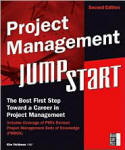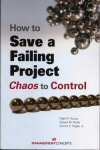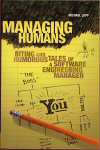

Barry Evans
Code Green, 2009
Buy it from Amazon.com
Buy it from Amazon.co.uk
It is plainly not quite british (with a small, old-fashioned lower-case b) to give your book a wacky title, a yellow cover, and to talk about things like personal balance. So, if you prefer your advice entirely technical, delivered by a shy engineer who never takes his eyes off the floor, this book won't be for you.
The title, however, has a prosaic explanation: Evans' brother got lost when driving (in far-off, pre-SatNav days), and while poring over a map afterwards, remarked that he had gone down the wrong leg of the trousers at a certain junction. And Evans' point is simply that if we are trying to solve a problem assuming we are where we aren't, a solution is unlikely. To put it in G. K. Chesterton's terms, "It isn't that they can't see the solution. It is that they can't see the problem" - which one might take as the credo for requirements analysis. But Evans is not talking only about getting your requirements straight, important as that is.
Evans means to go to the heart of the matter: managing projects means dealing with people, including yourself. This is not a purely technical task, and it can't be done well - you can't live well - without skills that sound entirely different from project planning and cost estimation, or as the rear cover blurb by Wyatt Woodsmall has it, the book "goes far beyond NLP and IT". For Evans is a "Neuro-Linguistic Programming" practitioner as well as an IT consultant, and the book has something of the style of both a self-help manual and a management paperback. NLP itself is an alternative therapy and "a model of interpersonal communication chiefly concerned with the relationship between successful patterns of behaviour and the subjective experiences (esp. patterns of thought) underlying them" (the OED's definition), and it has been applied to self-help, life coaching, and management training.
Clearly your Hemingwayesque "built-in, shockproof, crap detector" is by now flashing red, or amber at least. And indeed there are elements of Trousers of Reality that are hard to take, such as the claim that the book "explores the knowledge and wisdom of 3000 years". But against this, Evans is down-to-earth, practical and very sensible on many matters such as "agile thinking" and agile software development.
In other words, the book takes risks, and Evans is conscious of this as he attempts to take the reader into unexplored territory. For example, the fifth chapter is on Inspiration. This is not a topic that can be dealt with analytically: inspiration is not configuration management or project planning. So, instead, Evans writes in word-pictures, leaving things "packed" (encoded) rather than as "definitive answers" (page 75). He at once in fact gives an example (without saying up front that's what he's doing), mentioning Milton H. Ericsson as
"a master of inspiration. He was a master of language. If he were to want you to think of something relaxing, he would ask you to imagine your most relaxing experience."
The next paragraph begins
"If he had tried to describe his own most relaxing experience it would only have worked for some."
and the following paragraph starts
"A key to inspiring is to use this example."
There is no denying that Evans puts his money where his mouth is.
The success of Trousers must therefore be measured, like a mathematical proof, by whether it works in the mind of a suitable reader: if a proof convinces mathematicians, it is good; if Trousers changes the behaviour of managers for the better, it has worked.
Evans has some really good things to communicate in here. His approach is unconventional and bold. He speaks to the reader personally. He talks about managing humans, not about management theory. He talks about what works and what doesn't when dealing with people. And all that can be said is, if it gets people to reflect and do things a little better, the risks were worth taking.
(c) Ian Alexander, 2009
You may also like:






